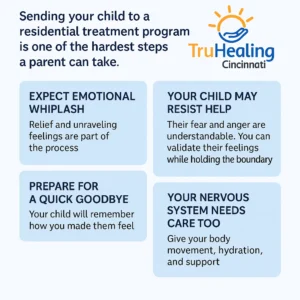The car ride might be silent. Or tense. Or tearful.
You may feel relief and guilt all at once.
You’re doing the right thing. And it still feels like your heart is being pulled in two.
Sending your child to a residential treatment program in Cincinnati is one of the hardest, bravest steps a parent can take. Whether your son or daughter is struggling with addiction, a mental health crisis, or both—it’s normal to feel terrified, exhausted, and emotionally raw.
This post won’t take away the pain. But it can help you prepare emotionally for Day One, so you don’t feel quite so alone.
Name the Guilt—Then Let It Sit Beside You
You may be thinking:
“If I had done something differently, maybe we wouldn’t be here.”
Let’s name it: that’s guilt talking. Not truth.
It’s normal to replay every parenting decision when your child is in crisis. But guilt doesn’t help you show up for your child. It pulls focus and wears you out. Instead of trying to push it away, treat guilt like an unwelcome passenger on this ride. Acknowledge it. But don’t let it steer.
You’re not sending your child away. You’re helping them access care you can’t provide alone. That’s not failure—it’s fierce, committed parenting.
Expect Emotional Whiplash
One minute you may feel relieved. The next, completely unraveled.
That’s not a sign something’s wrong. It’s what happens when your brain and body are finally allowed to feel what they’ve been holding.
When a child enters residential care, it often marks the first moment you’re not actively managing their crisis hour by hour. The emotional flood that follows—panic, grief, anger, guilt—is your nervous system catching up.
You don’t have to make sense of it all right away. Just know that these waves are part of the process. Let them come. They are not a sign you’re falling apart. They’re a sign you’re beginning to breathe again.
Your Child May Act Like They Don’t Want Help (Even If They Do)
Especially with teens or young adults, you might hear some version of:
“I don’t need this.”
“You’re ruining my life.”
“I’m only going because you made me.”
Deep breath. This is common.
Behavioral health treatment brings up shame and fear. Your child may be scared to open up. Angry about losing control. Worried about being judged. Their resistance isn’t necessarily a sign the treatment won’t help—it’s often part of how they protect themselves.
You can still validate their feelings while holding your ground.
Try: “I know you’re scared. That makes sense. But I believe this is a place where real help is possible.”
You can hold the boundary and hold their fear.

Prepare for the Goodbye Moment (Even If It’s Brief)
There may be paperwork. A quick staff introduction. And then suddenly, it’s time to say goodbye.
This moment can feel shockingly fast.
Some parents cry in the car afterward. Others go numb. Some swing into action—cleaning the house, calling family, researching everything they can.
There’s no “right” way to handle this. But know this: your child won’t remember what you said word-for-word. They’ll remember how you made them feel.
Even a simple “I love you. I believe in you. I’ll be here when you’re ready to talk” can plant a powerful seed.
You don’t have to be perfect. You just have to be steady.
Take Care of Your Nervous System, Too
You’ve been living in a state of hypervigilance—watching for signs, intervening, wondering if this is the day something breaks.
Now that your child is in residential care, your nervous system may not know what to do with itself. You might feel jumpy, weepy, exhausted—or totally flat. This is normal.
Try to give your body what it needs:
- Movement: Take a short walk daily, even if you don’t want to.
- Hydration & Nutrition: Drink water, eat food that sustains—not numbs.
- Space: Say no to over-explaining to extended family or coworkers.
- Support: Talk to one safe friend or parent in a similar situation.
Your child is getting care—and you deserve care, too.
Know What Communication Will Look Like
Each residential treatment program handles contact differently. At TruHealing Cincinnati, we believe in healthy family involvement, with boundaries that support healing.
Here’s what that might look like:
- Initial blackout period: Often the first 3–7 days without contact, to help your child adjust.
- Scheduled updates: Weekly progress check-ins with clinical staff.
- Family sessions: Therapist-led calls or Zooms that support healthy communication.
- Letters or journaling: Optional, but powerful ways to process and stay connected.
Not hearing from your child every day doesn’t mean they’re not thinking about you. It often means they’re beginning the internal work.
Your Grief Deserves a Seat at the Table
Let’s be real—this isn’t just a medical event. It’s an emotional one.
Many parents experience a form of grief when their child enters treatment. Grief over the life you thought they’d have. Grief over the fear that’s followed you for months—or years. Grief over how hard this season has been.
This grief is not a distraction from your child’s care—it’s part of your own healing. And it’s allowed.
You’re not just a parent managing logistics. You’re a parent managing love, fear, and the ache of uncertainty. Give yourself space to feel it.
You Are Still Their Parent (Even If You’re Not There Every Day)
In residential care, your child will have a team: therapists, nurses, mentors, peers.
But don’t confuse presence with significance. You still matter. You still shape their healing, even if you’re not there for every moment of it.
The way you talk about their care. The steadiness in your voice. The willingness to keep learning, to show up, to stay open—all of that matters.
Your love is not measured in hours spent in the same room. It’s measured in how fiercely you’ve fought to get them here.
What If You’re Still Not Sure You Made the Right Decision?
Doubt doesn’t mean you were wrong. It means you care deeply.
Every parent we’ve worked with has had a moment of thinking, “What if I just overreacted?”
But here’s the truth: no one ends up in residential care for nothing. Your child was hurting. You were hurting. And doing nothing was no longer an option.
Your decision wasn’t a leap into the unknown—it was a step toward a possible future your child couldn’t imagine for themselves. Yet.
FAQs for Parents Sending a Child to Residential Treatment
What is a residential treatment program, and how is it different from outpatient therapy?
A residential treatment program provides 24/7 care in a structured environment. Unlike outpatient therapy, which involves attending appointments while living at home, residential care removes outside triggers and gives your child time to stabilize emotionally and physically while receiving intensive support.
Can I talk to my child while they’re in treatment?
Yes, but communication is often structured. Many programs have an initial adjustment period (3–7 days) without outside contact. After that, you may have scheduled calls or family therapy sessions to rebuild healthy communication.
What should I pack for my child?
Each program has its own packing list. TruHealing Cincinnati provides clear guidelines on what’s allowed and what to leave at home. Essentials usually include clothing, toiletries, any prescribed medications, and comfort items (like photos or journals).
What if my child refuses to stay or wants to come home?
This is a common fear. If your child is under 18, you have the legal right to keep them in care. For young adults, we work collaboratively to engage them. Even resistant clients often begin to open up once they feel safe and supported.
How can I support my child after treatment ends?
Recovery doesn’t end with discharge. Aftercare planning is key. TruHealing Cincinnati offers outpatient and step-down options, and we work with you to build a sustainable plan for long-term support.
You Are Not Alone—Even If It Feels That Way
In the Cincinnati area, hundreds of families are walking similar paths. If you’re searching for a residential treatment program in Lawrenceburg or Lexington, Kentucky, know that TruHealing Cincinnati is here to offer support, clarity, and compassion.
No one plans for this. No one expects to be here. But you’re not the only one who’s fought through fear to help their child find a foothold.
And you don’t have to do it all alone anymore.
Need someone to talk to about what comes next?
Call (888) 643-9118 or visit TruHealing Cincinnati Residential Treatment Program to learn more about how we support families just like yours through every step of the residential care journey.

